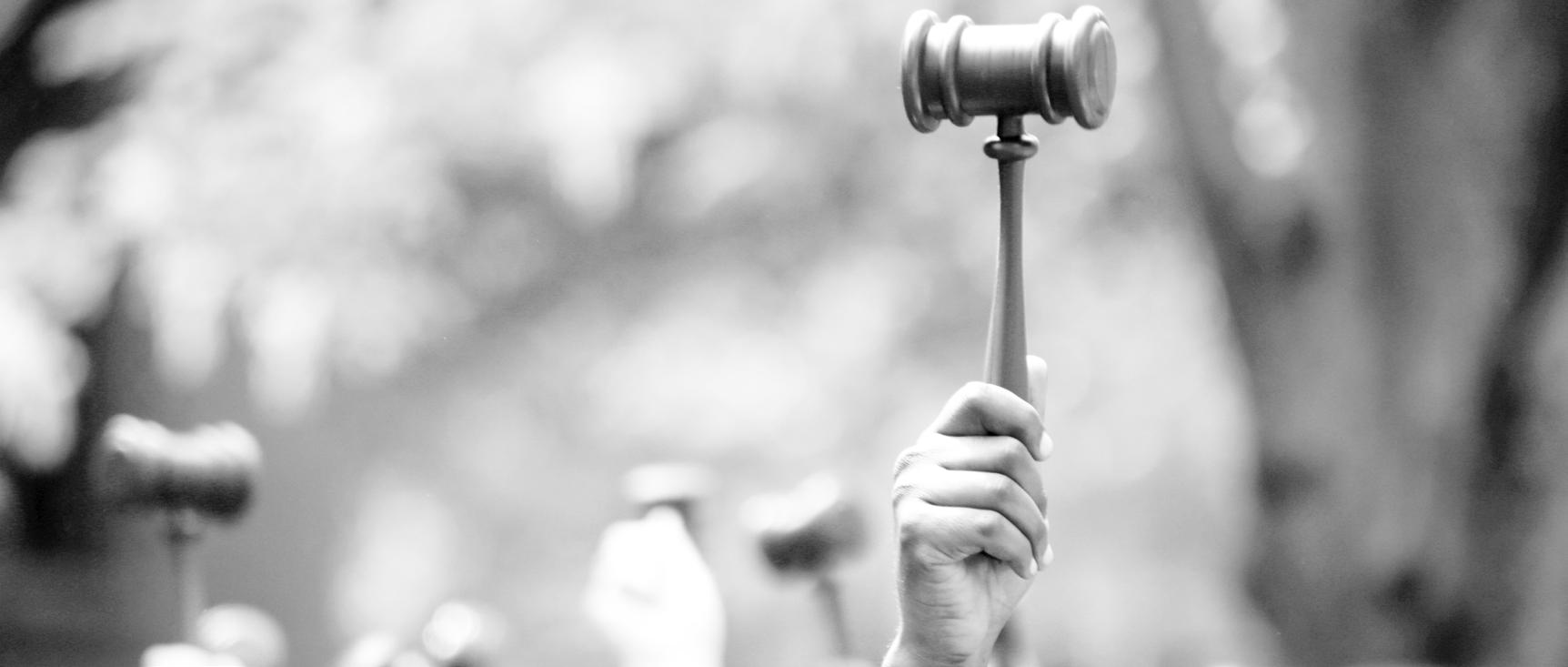
24 minute read
News
Ethnic Studies Faculty Candidate Visits Harvard
By james s. bikales and kevin r. chen Crimson Staff Writers
Erika Lee, a history professor at the University of Minneso ta and a candidate for the Faculty of Arts and Sciences’s ethnic studies faculty search, gave a lecture on her research and met with undergraduates on campus Wednesday afternoon.
Dean of the Faculty of Arts and Sciences Claudine Gay an nounced in June 2019 that she will hire three to four senior faculty who specialize in Asian American, Latinx, and Muslim studies by the end of the current academic year.
Gay said that each of the po tential hires would visit campus as part of an FAS lecture series titled “New Perspectives on Ethnicity and Migration.”
Lee researches immigration and Asian American history, as well as directing the Immigra tion History Research Center at the University of Minneso ta. She was the first candidate to speak on campus and came at the invitation of Harvard’s His tory department.
More than 70 people, includ ing students, faculty, and administrators, filed into a theater in Harvard’s Carpenter Center to attend Lee’s lecture, titled “Xenophobia: A Racial History of the United States.”
During her lecture, Lee said xenophobia is not just about im migration, but can rather be understood as a form of racism. She also traced the history of an ti-immigrant sentiment against various groups in America ranging from Catholics to Lat inx people. While other scholars have said xenophobia rises and falls in response to nation al crises, Lee contended that xenophobia has remained strong throughout American histo ry, calling it a deeply ingrained “American tradition.”
Following the lecture, Lee spoke with roughly 20 Harvard affiliates during a question and answer session. The discussion ranged from Lee’s pedagogical approach to Harvard’s lack of a formalized ethnic studies con centration.
Addressing a question on how she would navigate what a student called Harvard’s “ideo logical resistance” to accepting ethnic studies as a legitimate scholarly field, Lee said she would be “pretty forceful” in pushing back against such a view.
“I don’t have very much pa tience for those who would continue to question whether ethnic studies is a legitimate field anymore or not,” Lee said. “I think I’d be ready to take on peo ple with that perspective and provide some data.”
FAS spokesperson Anna G. Cowenhoven declined to com ment on criticisms raised at the question and answer session.
During the discussion, stu dents expressed frustration about the lack of ethnic studies classes. Lee said she shared this feeling when she was in school. “I kept on thinking, someone should be writing more about this and I kept on waiting for someone, like for more stuff to be written,” she said. “Then I re alized, ‘I don’t think this is going to happen,’ so maybe that some one should be me.”
Lee praised ethnic studies advocates at Harvard for creat ing “an opportunity” to build the program, but she also pushed them to make specific requests Erika Lee, a history professor at the University of Minnesota, spoke with undergraduates on Wednesday regarding her candidacy for professorship at Harvard. sara komatsu—Crimson photographer
that the candidates who are cho sen could negotiate over during their hiring processes.
“It would be helpful to have a clear description of what stu dents’ needs are so that that can be part of the ask,” she said.
Gay’s announcement of the ethnic studies faculty search came months after students and alumni protested the depar ture of two tenure-track faculty specializing in Asian American studies.
The University’s Novem ber decision to deny tenure to Romance Languages and Lit eratures Associate Professor Lorgia García Peña — who re searches race and ethnicity — reinvigorated student calls for an ethnic studies program at Harvard.
Harvard affiliates have lob bied for a formalized ethnic studies program for nearly five decades. Gay declared an “in stitutional commitment” to the field of ethnic studies in a De cember email to FAS affiliates and has said she is “hopeful” that faculty will lead an effort to develop a formal ethnic studies concentration.
At least seven more candi dates will visit Harvard this semester as part of the lecture series associated with the FAS faculty search.
Other speakers will include University of Michigan histo ry and Latino studies professor Jesse E. Hoffnung-Garskof ’93, University of California, Los Angeles sociology and Asian American studies professor Min Zhou, University of Pennsylva nia English professor David L. Eng, University of California, Berkeley ethnic studies profes sor Raúl Coronado, Stanford sociology professor Tomás R. Jiménez, Yale American studies professor Zareena Grewal, and University of Minnesota Amer ican studies professor Martin F. Manalansan.
james.bikales@thecrimson.com kevin.chen@thecrimson.com
Harvard Law School Welcomes New Faculty Members
By Kelsey J. griffin Crimson Staff Writer
Harvard Law School welcomed two new faculty members this semester — election law expert Nicholas O. Stephanopoulos ’01 and former Federal Reserve Board Governor Daniel K. Ta rullo.
After graduating from Yale Law School in 2006, Stepha nopoulos worked as an associate at Jenner & Block in Washington, D.C. focusing on redistricting, campaign finance, and federal litigation.
He then taught courses on election law, constitutional law, and administrative law at the University of Chicago Law School, where he served as a professor of law and the Her bert and Marjorie Fried Research Scholar.
Stephanopoulos also co-founded PlanScore, a web site that scores and assesses redistricting plans in all 50 states. Tarullo previously taught courses in international law and financial regulation at the Law School, Georgetown Uni versity Law Center, Princeton, and the University of Basel in Switzerland.
He also worked for the Clin ton administration and the Antitrust Division of the U.S. Department of Justice.
In addition to his role on the Federal Reserve Board, Tarullo served as the chair of the Fed eral Financial Institutions Examination Council and a member of the Federal Open Market Committee.
Tarullo now serves as the Norman Professor of Interna tional Financial Regulatory Practice and teaches Regula tion of International Finance.
“Dan Tarullo is one of the country’s leading thinkers on financial regulation and inter national economic policy,” Law School Dean John F. Manning ’82 said in a press release. “Dan has also shown himself to be a superb teacher and colleague!” Stephanopoulos is teaching a course on election law at the Law School this semester.
He said he thinks his field sits at a unique intersection be tween politics, democratic theory, political science, and the study of the Constitution.
“As a politics junkie I’ve al ways been interested in elections and politics, and then what law gives the table is dem ocratic theory and the legal protections for certain politi cal rights,” he said. “I think it’s so interesting how all these dif ferent fields sort of collide these together and shorten the field of election law.”
He noted the Law School faculty has lacked an expert in election law for several years, and he hopes to use his profes sional experience to revive the study of the field.
“Harvard hasn’t had an elec tion law specialist on the faculty for quite a while — at least 16 years,” Stephanopoulos said. “I think that’s such an import The Harvard Law School recruited multiple new faculty members this semester, including election law expert Nicholas O. Stephanopoulos ’01 and former Federal Reserve Board Governor Daniel K. Tarullo. kathryn s. kuhar—Crimson photographer
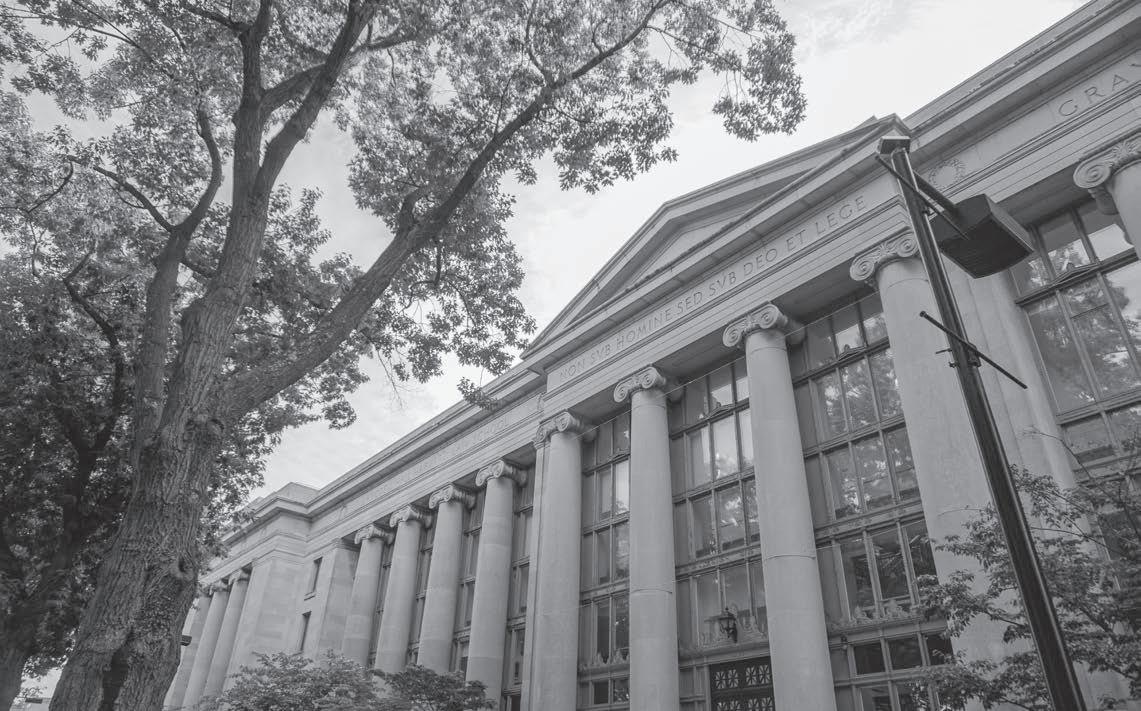
ant offering for Harvard Law to have for students and for, you know, the institution as a whole.”
Manning emphasized the significant contributions of Stephanopoulos’s work to elec tion regulation in a Jan. 28 press release.
“I am thrilled that Nick Stephanopoulos has decid ed to join our faculty,” he said in the press release. “Through his work across multiple disci plines, Nick has helped to identify simultaneously creative and thoroughly grounded ways to improve the functioning of our electoral system and our democracy.”
Law School professor Hol ger Spamann similarly praised Tarullo in an emailed state ment. “He is far and away the best person in the field of financial regulation,” Spamann wrote. “Nobody else even comes close in terms of experience, sophis tication, and thoughtfulness.”
kelsey.griffin@thecrimson.com
Transformative coverage.
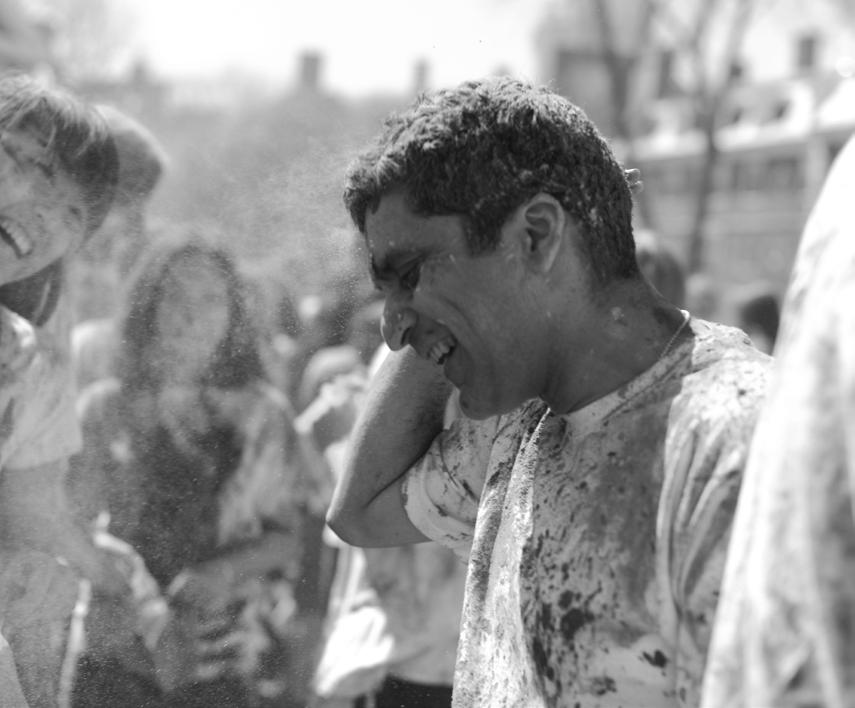
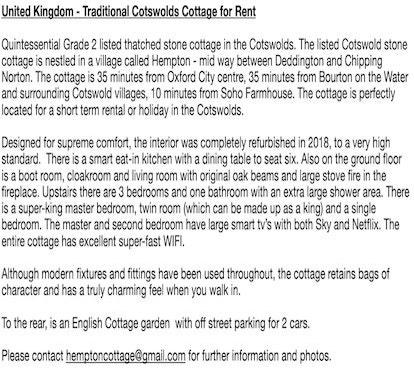
The Crimson thecrimson.com
Department of Ed to Probe Harvard Funding research From Page 1
and beginning to prepare its response to the Department of Education,” Swain wrote in an email.
The letter to Harvard comes as part of an ongoing review by the federal government of American universities’ con nections to foreign governments.
Federal officials have al leged several colleges and universities are soliciting money from hostile foreign govern ments, companies, and individuals that are potentially attempting to steal American universities’ research.
Thus far, the investigation has found that universities across the country have failed to properly report $6.5 billion in foreign funding, according to the Journal.
Since June 28, 2019, the De partment of Education has opened eight civil compliance investigations into other uni versities, including the Massachusets Institute of Technology and the University of Maryland.
Last fall, Harvard adminis trators announced the University had created two new oversight committees to prevent University researchers from taking such actions, which are known colloquially as “aca demic espionage.”
The letter said that the De partment of Education “is aware of information suggest ing Harvard University lacks appropriate institutional con trols” on donations, and directly referenced Charles M. Lieber and Jeffrey Epstein.
In January, Lieber — the former Harvard Chemistry de partment chair — was arrested and charged with failing to disclose funding he received from the Chinese government. Prosecutors also alleged Lieber failed to disclose funding to the University.
Harvard’s Office of the Gen eral Counsel is undertaking a review of billionaire donor and convicted sex offender Ep stein’s donations to the University.
Federal officials are also in vestigating Yale University over allegations that the school did not disclose at least $375 million in foreign funding. Yale filed no reports between 2014 and 2017, according to the Journal.
The Education Department can take the case to the Depart ment of Justice to levy civil or criminal charges if the schools do not turn over the informa tion within 60 days.
Section 117 of the Higher Education Act — passed over 30 years ago — requires insti tutions of higher education to report contracts and gifts from foreign sources valued over $250,000 a year.
ellen.burstein@thecrimson.com camille.caldera@thecrimson.com
funding From Page 1 Harvard Took in $1.1 Billion from 61 Nations 2013-2019
In its letter, Department of Education officials asked the University to disclose information about contracts or gifts connect ed to multiple foreign governments and other overseas organizations. The notice came amid an ongoing federal review of American universities’ connec tions to foreign governments.
“Harvard University lacks appropriate institutional con trols and, as a result, its statutory Section 117 reporting may not in clude and/or fully capture all reportable gifts, contracts, and/or restricted and conditional gifts or contracts from or with foreign sources,” the letter read.
Of the $1,151,597,169 total for eign funds Harvard reported to the Education Department, it obtained $396,739,951 through contracts, while $754,857,218 came in the form of monetary gifts, a Crimson analysis of the Education Department data found.
Sources from England boast ed the highest sum given to Harvard, at $224 million. That figure represents about 20 percent of all funding English sourc es donated to American higher education institutions over the same time period. Hong Kong came in second at $161 million — around 23 percent of its total to all American universities.
In its letter to Harvard, the Department of Education re quested records regarding the University’s donations from China, Iran, Russia, Qatar, and Saudi Arabia.
At $94 million, China has the third highest total donations to Harvard currently logged in the department’s records.
The University reported over $30 million from sources in Sau di Arabia, which ranked 10th on the list of Harvard’s top donor nations.
The funds made up slightly over four percent of the coun try’s donations to all American universities over that period. Harvard also reported five donations from Qatar, totaling about $6 million — less than one percent of Qatar’s more than $1 billion in donations to American colleges and universities. Har vard reported no donations from Iran or Russia over the six-year period.
Between July 2011 and June 2018, Harvard raised $9.6 bil lion in a record-breaking capital campaign. Individuals from 173 countries contributed to the campaign, according to Univer sity spokesperson Christopher M. Hennessy.
About 15 percent of campaign dollars came from internation al donors, who comprised nine percent of individual donors overall, per Hennessy.
“In 2018, the university con cluded a successful capital campaign,” Hennessy wrote in an emailed statement. “Such philanthropy supports the uni versity’s core teaching, learning, and research mission.”
ellen.burstein@thecrimson.com camille.caldera@thecrimson.com
Leverett Closes Dining Hall at Night for Cleaning Purposes
By declan j. knieriem Crimson Staff Writer
In an email to House residents last week, Leverett students were told they could no longer pull all-nighters — at least in their dining hall.
The email — sent by Leverett Building Manager Paul J. He garty — informed students the dining hall would be closed be tween 2 a.m. and 6 a.m. in the coming months to allow the House staff more time to clean the space.
Hegarty added that 24/7 ac cess to the room would be restored during reading period.
“With so much activity in the dining hall all the time, we need to give the staff adequate time to clean the floors every night,” he wrote. “This will help with pest control and the overall cleanliness.”
In September, Leverett Fac ulty Deans Brian D. Farrell and Irina P. Ferreras came un der fire for a slew of new restrictions on common spaces throughout the House.
The new restriction, howev er, has not drawn the same level of outcry from students.
Leverett resident Vaughan K. Mcdonald ’20 said he under stands why the restrictions are necessary.
He cited an “abundance” of office hours and study groups as a reason why the dining hall staff may need more time to clean the space.
Mcdonald also said student opinion on the dining hall clos ing has been more “divided” than earlier instances.
“I think some people have sort of painted it as another Le verett space closed, but I don’t think I have enough informa tion,” he said.
“When other spaces have been restricted, I think it was more unilateral,” he added.
Luke G. Minton ’20 — anoth er Leverett resident — also said he respects the decision but is “sad” to see restrictions put in place.
He described the dining hall as having an “infamous reputa tion” as a late-night study spot. “The dining hall is near and dear to my heart,” he said. “I spent a lot of time in Lev d-hall, and especially in the last se mester, a lot of people have been noticing that there’s been an increasing pest problem. It’s something that you’re going to deal with when you have things like brain break, and situations where you have a lot of people studying late at night.”
Minton also said he hopes College administrators under stand that dining halls serve as an ideal workspace for students staying up late to study.
“To be realistic, the admin istrators at Harvard — including the faculty deans in all the various Houses — need to un derstand that Harvard students are going to be staying up really late at night,” he said.
“I guess it’s just the question of what are the most efficient places to do that, and if you’re living in upperclassman House it’s really helpful if you have a place to study that’s close by to where you are and allows the sort of collaboration that a din ing hall does,” he added.
declan.knieriem@thecrimson.com

Leverett House has recently decided to close the dining hall from 2 a.m to 6 a.m. to give the dining hall staff adequate time to clean the floors and work on pest control. MyeongSeo ki —Cri on photographer
New Harvard LabXchange Platform Delivers Free Science Classes
LabXchange is an online learning initiative offered by Harvard and the Amgen Foundation. aiyana g. white—Cri on photographer
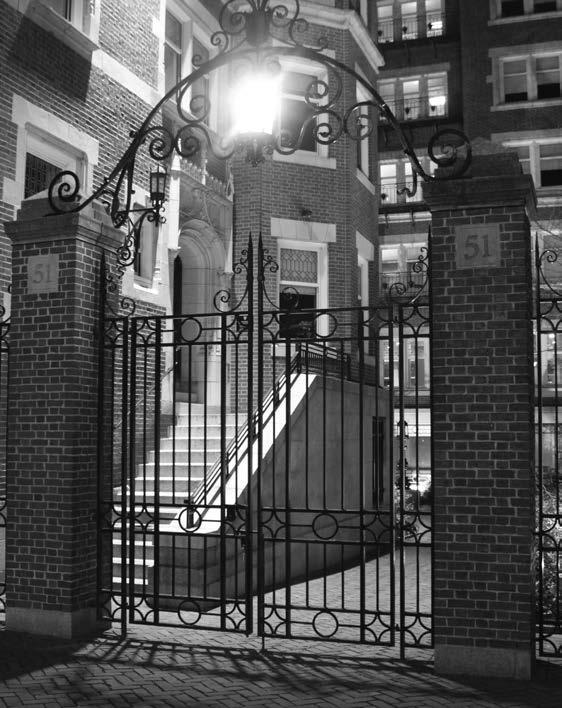
By andy z. wang Crimson Staff Writer
LabXchange — an interactive learning platform aimed at bringing science education to students around the world and created by the Faculty of Arts and Sciences in collaboration with the Amgen Foundation — launched last month.
Developed for a “digital classroom,” the program aims to foster a virtual scientific lab community, particularly for students who do not have access to scientific instruments and experiments.
As a founding sponsor, the Amgen Foundation provided $11.5 million in grants to devel op the program.
Much of the content focus es on the biological sciences, with course clusters such as “Genome Editing with CRIS PR-Cas9” and “Foundational Concepts and Techniques in Biotechnology,” according to the platform’s website.
LabXchange’s platform uti lizes open-source infrastructure from edX, a virtual learning website developed by Harvard and MIT.
This allows current edX students to connect to the new platform.
At the same time, Molecu lar and Cellular Biology Professor Robert Lue, the faculty director of LabXchange, said it aims to address some of the gaps with current virtual learning, such as the lack of flexibility in course structure.
“Ultimately, instead of go ing online and taking a course, you can go and find individu al assets, be it videos or text or graphics,” Lue said.
“You can actually pick the ones you want, sequence them into a learning pathway, and create a much shorter experi ence that’s really tailored to exactly what you need to learn,” he added.
To increase the reach of its resources, Harvard affiliates who worked on LabXchange said it has developed virtual lab simulations that can walk stu dents through an experiment.
“I’ve heard of several high school classrooms that do ab solutely zero labs at all, just because it’s cost-prohibitive for them to get those things going,” Nico O. Wagner, a teaching as sistant in the Molecular and Cellular Biology department who helped create content for the site, said. “The good thing about LabXchange is that the students get virtual access to experiments, and all they need is access to a computer.”
The new platform incorpo rates various types of learning modules that address content delivery flaws in traditional on line learning interfaces, according to Tess Gadd, a user interface designer who worked on the project.
“The problem with videos is that if somebody’s speaking, you kind of can get lost quite quickly,” Gadd said.
Gadd also pointed to the platform’s “adaptive scrollable” feature, developed to address this shortcoming.
“As you scroll down the page, everything animates as if it were a video, but you have com plete control over that speed,” she said.
“I think that’s a really inter esting way to give people more power when it comes to their own learning,” she added.
Some educators have also used the platform to comple ment in-class education and experiments.
At Harvard, the teaching staff of Life Sciences 1a: “An In tegrated Introduction to the Life Sciences” used the plat form last fall to show students techniques ahead of lab sec tions, helping them become more familiar with lab proce dures, according to the course’s website.
High school teachers have also adopted the program. Mary S. Liu ’09, a biology teach er at Weston High School, said she first learned of LabXchange through an outreach program for high school educators, and then joined a focus group to de velop it.
“I’d put extra resources there for them to access,” Liu said. “I do the pre-lab, so they actual ly have a virtual simulation of lab techniques that I do in class with my students. A lot of times, it’s new for the high school stu dents to do bacterial culture or to work with gel electrophore sis, so they can get familiar with the tools.”
Liu said she understands why her students appreciated the program.
“Kids like digital things,” she said.
andy.wang@thecrimson.com
The sights and sounds of Harvard.

The Crimson @crimson_photo
Law School Library Makes Scalia Collection Public
By kelsey j. griffin Crimson Staff Writer
The Harvard Law School Library announced the first public release of late Supreme Court Justice Antonin G. Scalia’s pa pers, photographs, and various other items Tuesday.
A graduate of the Law School class of 1960, Scalia regularly visited campus during his life time, often judging the Ames Moot Court Competition. He worked on the U.S. Court of Ap peals for the D.C. Circuit from 1982 to 1986 before serving on the Supreme Court for 30 years. Following his death in 2016, Sca lia’s family donated his legal and academic papers to the Law School.
When announcing the dona tion in 2017, Scalia’s wife, Maureen M. Scalia ’60, said Harvard was significant to their relation ship.
“Nino and I met as students in Cambridge, when he was at the Law School and I at Radcliffe,” she said. “Our visits back to Har vard together always felt like a homecoming, particularly in re cent years. I am pleased to make this gift, and that his papers will now be at the Law School.”
While most of the collection consists of papers from his time on the Supreme Court and the Washington D.C. Court of Ap peals, the library will not release any case materials during the lifetime of other justices and judges involved in the cases for which Scalia worked.
The first batch of the collec tion released this week includes pre-Supreme Court files; cor respondence, speaking engagements, and event files through 1989; photographs and audiovi sual materials dated from 1975 to 2016; and other miscellaneous documents such as articles about Scalia throughout his time on the Supreme Court.
“We are deeply honored that Harvard Law School has been entrusted with the Justice’s his toric papers, and we now have the opportunity to share these papers,” Harvard Law School Dean John F. Manning ’82 wrote in a press release. “This archive will allow generations of schol ars to come to Harvard Law School to study the record of Justice Scalia’s historic tenure on the Supreme Court.”
Manning served as a law clerk for Justice Scalia from 1988 to 1989.
In the release, Jonathan L. Zittrain, professor of interna tional law and director of the Law School Library, noted the importance of preserving Scal ia’s collection for future generations of scholars.
“The Harvard Law School Library’s patrons are not only those using the library today, but those who will follow,” he wrote. “We secure irreplaceable pa pers such as these as part of the solemn pursuit of citizens and scholars understanding the tra jectory of the law not only from its formal outputs, but through the contemporaneous notes as it was forged.”
kelsey.griffin@thecrimson.com
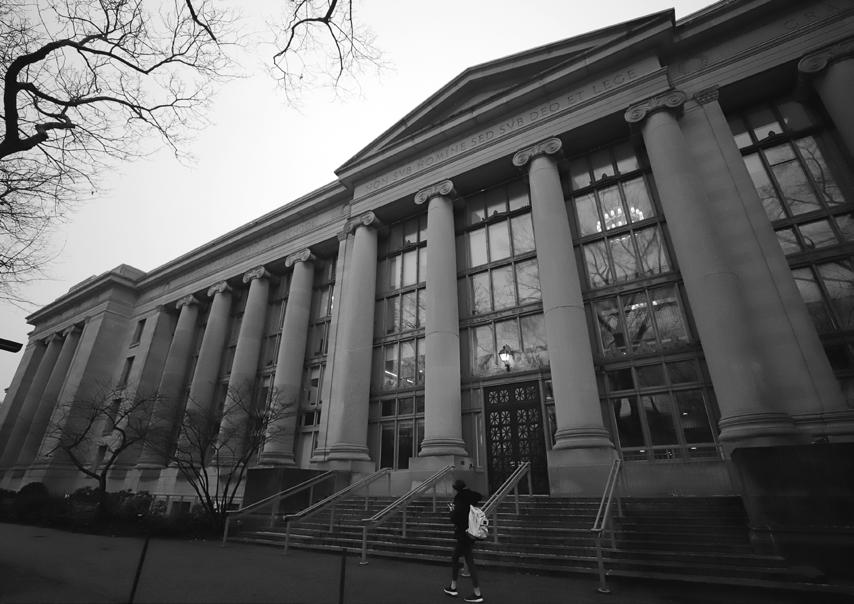
Some of late Associate Justice Antonin G. Scalia’s papers will be on display in the Harvard Law School Library. myeongseo kim—Crimson photographer
Kennedy School Offers Program on Politics, Youth
The Harvard Kennedy School is offering a workshop series through the Center of Public Leadership and Politics which will focus on how to run for office. zado i.n. Gee—Crimson photographer
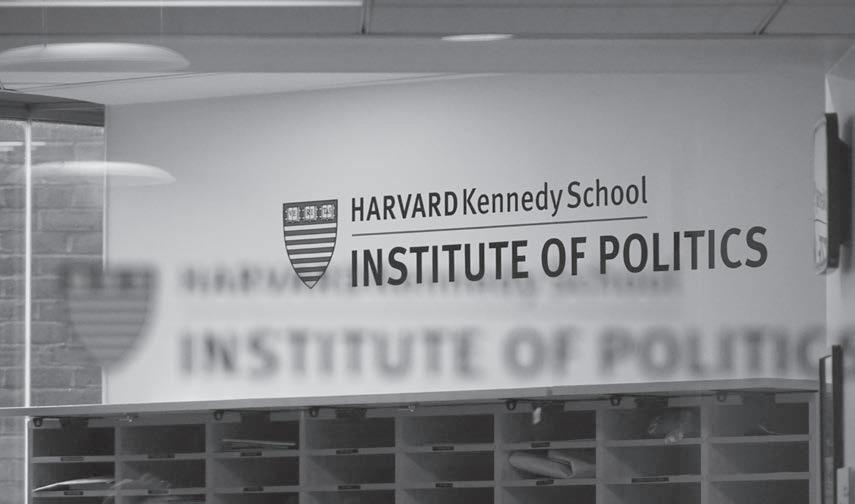
By sixiao yu Crimson Staff Writer
Massachusetts State Senator Eric P. Lesser ’07 will lead the Kennedy School’s “Hi! I’m Running for Office” program for the third time this spring. The workshop series — de veloped by the Center for Public Leadership and the Institute of Politics — focuses on exam ining issues of youth political participation. It brings togeth er graduate students from the Kennedy School and the Law School, as well as students from Harvard College.
Lesser said he continues to participate in the program be cause he believes in empowering “young people from backgrounds or from places that have historically not been rep resented” to run for office and govern.
“I think politics can often feel very distant, it can feel very intimidating for people, espe cially young people, especially whether it’s women or people of color or people from different backgrounds,” he said. “I think, often times there’s too much fo cus on the politics, there’s too much focus on the campaigns, and there’s too much focus on election day, and not enough fo cus on what comes after election day.”
In the past, the workshop series has featured guests like current Democratic presiden tial candidate Pete P. M. Buttigieg ’04 and CNN political analyst David Gergen.
Lesser said this year, the list of guests includes figures like Jorge O. Elorza — the mayor of Providence, R.I. — and newly elected New York State Senator Alessandra Biaggi.
“One thing that they re ally all have in common is that they’ve beaten the odds. They’ve brought something new to their office, and they’ve crashed the gate, so to speak,” Lesser said.
He also spoke about the im pact the program has had on him personally.
“This is such a great moti vator for me for my day job, you know. I’ve learned so much. I’ve learned so much from the students, I’ve learned so much from the guests, and I bring that back to my work,” Lesser said.
He added, “I think now, af ter the three years of doing it, I’ve learned so much about how to be effective, how to serve a community, how to move and idea and an issue forward, frankly, from learning from the other guests and from the stu dents.”
Monica Y. Chang ’23, an un dergraduate who said she is participating in the workshop series, wrote in a text message that the program has been “in credibly inspiring” so far.
“Although this was just my first session in the Running for Office Workshop Series, I can already tell it will be a fantastic experience,” Chang said.
“I was awed by the diversi ty of experience in the room — with students from the Kenne dy School, Law School, College, and every walk of life.
Hearing everyone’s unique story — what’s shaped their as pirations, what they care about, and where they come from — was incredibly inspiring.”
sixiao.yu@thecrimson.com
eliot From Pag e 1
Eliot Deans’ Departure Creates Fifth Faculty Dean Post to Fill
Dean of the College Rakesh Khurana praised Moulton and O’Keefe’s “unwavering” com mitment to their students and staff during their decade-long tenure in an email to Eliot res idents last week.
“I am forever grateful to them for all that they have done to enrich the lives of countless students throughout the years, and to fostering such a strong sense of community at Eliot House and beyond,” Khurana wrote.
Last month, Quincy House Faculty Dean Lee Gehrke an nounced he would step down from his role at the end of the academic year after the loss of his wife and co-faculty dean Deborah J. Gehrke, who died from breast cancer in Decem ber.
Cabot Faculty Deans Rakesh Khurana and Stephanie R. Khurana announced their de parture in November. They came to Cabot in 2010 and stayed through Rakesh Khura na’s appointment as Dean of the College in 2014.
After leading Kirkland for 20 years, Verena A. Conley and Thomas C. Conley also an nounced they would step down in November. Former Win throp Faculty Deans Ronald S. Sullivan, Jr. and Stephanie R. Robinson departed last spring after Khurana announced that he would not renew their con tract. The decision followed months of outcry surrounding Sullivan’s decision to represent Hollywood producer Harvey Weinstein against sexual abuse charges.
Rakesh Khurana Dean of the College
In recent weeks, Winthrop students have lobbied for the College to keep current interim faculty deans Mark D. Gearan ’78 and Mary Herlihy-Gearan in their roles, who have led the House since August.
Despite those calls, the Col lege has repeatedly noted that Gearan and Herlihy-Gearan were only appointed for a sin gle year.
The Dean of Students’ Office is currently soliciting nomina tions from House affiliates and freshmen alike to fill the five vacated faculty dean posts.
“Although you haven’t yet experienced House life, Facul ty Deans have an enormous impact on students’ experiences,” Senior Assistant Dean of Resi dential Life and First-Year Students Nekesa C. Straker wrote to freshmen in a Wednesday email soliciting nominations. “They live in residence at each House, engage and advise stu dents, oversee House staff, and help set the tone and culture for the House community.”
After drawing up a short list of candidates, the College will then form search commit tees, host meetings where students and tutors can share input regarding possible candidates, and consult University administrators before making a final selection in each of the five Houses.
juliet.isselbacher@thecrimson.com amanda.su@thecrimson.com
Like The Crimson on Facebook.

Facebook.com/ TheHarvardCrimson
